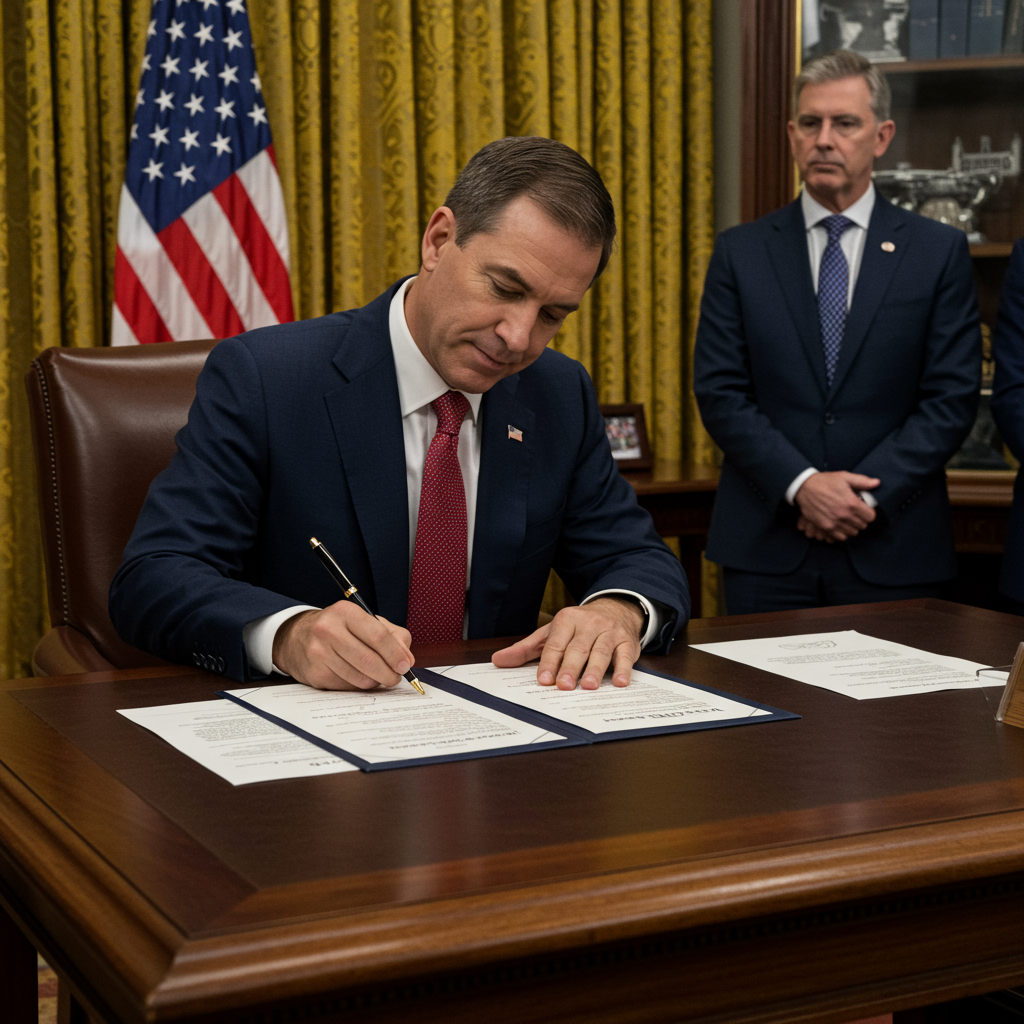The UK economy faces significant headwinds. Recent reports paint a challenging picture for the nation’s finances. A monthly dip in growth figures alongside stark warnings from the official forecaster signal tough times ahead. Experts now suggest substantial tax increases are likely on the horizon. This analysis explores the reasons behind the gloomy forecasts and potential impacts on taxpayers.
The OBR’s Wake-Up Call on Public Finances
Britain’s official forecaster, the Office for Budget Responsibility (OBR), recently issued a critical report. Their long-term assessment highlighted “daunting” risks for the UK’s public finances. Worryingly, government debt could potentially triple relative to the size of the economy over the coming decades.
Richard Hughes, head of the OBR, used notably strong language. He stated the country simply “cannot afford the array of promises that are displayed to the public.” This assessment is based on reasonable assumptions about costs and economic growth projections.
The OBR’s report also pointed to a recurring pattern. Multiple governments have demonstrated a tendency towards U-turns on tax and spending decisions. This trend was underscored by recent government reversals on welfare savings and the winter fuel payment policy. Compared to other advanced economies, the UK’s position appears vulnerable. The OBR found Britain ranks sixth highest in debt, fifth highest in annual borrowing, and third highest in borrowing costs among 36 nations surveyed. The clear message is that repeatedly increasing borrowing is not a sustainable strategy. This approach cannot fund rising day-to-day spending pressures over the long term.
Deep-Rooted Spending Pressures Persist
Despite the need for fiscal restraint, pressure to increase spending remains stubborn. This is driven by fundamental geopolitical and societal changes. Several specific areas highlight this persistent challenge:
Health and Disability Costs: The OBR’s current forecasts make an optimistic assumption. They expect the post-pandemic surge in incapacity and disability cases to halve by 2029. This outcome is highly uncertain.
Social Care Burden: Local councils face immense pressure from social care costs. Some councils now spend over 80% of their revenue on adult and children’s social care. Across all councils, this figure averages 58%.
Special Educational Needs (SEN): Ballooning budgets for SEN pose a severe risk. A £4.6 billion special financial arrangement is needed to address this crisis. Without it, mass local authority bankruptcies could occur.
Defence Spending: The commitment to raise defence spending is substantial. Meeting the new Nato target of 3.5% of GDP is projected to cost nearly £40 billion extra per year by 2035.
The OBR’s report essentially served as a polite call for realism. It urged policymakers to acknowledge the difficult choices that lie ahead for the UK.
Why Significant Tax Rises Seem Likely
Given the combination of spending pressures and limited fiscal space, tax increases appear increasingly unavoidable. The autumn Budget is widely expected to include measures to raise significant revenue. Estimates suggest tax rises could amount to between £10 billion and £20 billion.
The most prominent, though often overlooked, form of tax increase is the ongoing freeze on income tax thresholds. While not a change to tax rates, this measure pulls more people into higher tax brackets as wages rise. Experts calculate this freeze alone is equivalent to an £11 billion tax rise over three years. By 2029, its annual impact is projected to exceed £40 billion. This is comparable to adding 6 pence to the basic rate of income tax. The government has explicitly committed not to increase the main rates of income tax, National Insurance, and VAT. However, the threshold freeze achieves a similar revenue increase through stealth.
Discussion is also opening up around potential wealth taxes. Property and inheritance taxation are likely targets. As the baby boomer generation undertakes a mass transfer of trillions in housing equity, the Treasury sees an opportunity. They are considering mechanisms to “ensnare bountiful revenues” from this generational shift. The goal is to help fund the costs of an ageing society. This approach aims to avoid placing the entire burden solely on working households. Furthermore, there are reports that increasing employers’ National Insurance Contributions could be on the table. This aligns with carefully worded manifesto commitments that focused only on employee NICs rates.
Navigating the Fiscal Tightrope and New Rules
The current government faces a delicate balancing act. Chancellor Rachel Reeves intends to adhere to specific fiscal rules. These rules require day-to-day spending to be funded by tax revenue. They also mandate government debt must fall as a share of national income by 2029-30. However, the challenge is substantial. The current buffer, or “headroom,” to meet borrowing limits is a very tight £10 billion.
The economic landscape has shifted, making fiscal targets harder to hit. Lower-than-expected growth and higher government borrowing costs have “blown the budgetary numbers off course.” This necessitates adjustments to keep figures aligned with targets. New, stricter fiscal rules have been introduced. Alongside an “investment rule” permitting borrowing for major projects, a “stability rule” is particularly stringent. It demands all day-to-day spending (departments, welfare, debt interest) be covered by tax over a set timeframe. This rule is designed to demonstrate overwhelming political tolerance for difficult decisions. The strategy aims to signal fiscal credibility to financial markets. The hope is this will lead to lower borrowing costs for everyone.
Ministers are already exploring savings. Reforms to the health-related welfare bill are being considered. There are questions about whether the Personal Independence Payment (PIP) is the right tool for managing the surge in mental ill health cases. Significant welfare cuts were previously announced. Civil service administration costs are also targeted for reduction (£2.2 billion by 2029-30), potentially involving job losses, though feasibility is debated.
External factors also play a role. Global trade shifts, partly influenced by US tariff policies, are pushing up UK borrowing costs. They are also challenging the traditional safe-haven status of the dollar and US debt. This creates a “worst of both worlds” scenario for borrowing forecasts.
Political Context and Impact on Confidence
Implementing potentially unpopular tax rises requires political strength. While the current government has a large parliamentary majority, recent policy U-turns have raised questions about its practical authority. Political debate around tax is described as a “fiscal phony war.” Parties focus on what tax rates they won’t raise, while relying on less visible increases like the threshold freeze. A long history of circumvented tax pledges makes voters wary.
Government warnings about a “painful” upcoming Budget have already had an impact. Consumer confidence has reportedly fallen significantly. This decline is directly linked by some economists and business leaders to the government’s “downbeat rhetoric.” It suggests consumers anticipate tax rises taking money out of their pockets. The government may be engaging in “expectation management.” This involves getting “all the bad news out beforehand.” The aim is that the actual Budget might “not feel so bad” in comparison.
Glimmers of Hope Amidst the Uncertainty
Despite the fiscal challenges, some positive signals exist. A return to robust economic growth remains the greatest hope for easing pressures. The Chancellor’s fiscal rules reportedly leave room for longer-term infrastructure investments. While planning reforms are needed, they could eventually boost construction.
The UK’s position as a relatively stable island in a turbulent global trade environment could also yield benefits. Some leading global business figures have expressed strong interest in the UK’s potential for frontier tech investment. Recent economic data shows a slight improvement in confidence levels. More interest rate cuts are also anticipated. Some City economists believe the gloomy outlook is exaggerated. They argue the UK may be “past the worst,” pointing to resilient stock markets and a strong sterling. Opportunities may also arise from economic deals, potentially positioning the UK as “the best of both worlds” globally.
Frequently Asked Questions
What specific economic reports are warning about UK tax rises?
Two key reports are setting the stage for expected UK tax rises. Firstly, recent monthly figures showed a dip in the UK’s economic growth (GDP). Secondly, the independent Office for Budget Responsibility (OBR) released a long-term report. This report warned of “daunting” risks to public finances and unsustainable spending promises, directly implying a need for increased revenue or spending cuts.
How might potential UK tax changes affect different taxpayers?
Likely tax changes could affect various groups. The ongoing freeze on income tax thresholds acts as a tax increase for many as wages rise, pushing them into higher brackets. Discussions around wealth taxes, like property or inheritance taxes, could specifically impact wealthier individuals transferring assets. Changes to National Insurance, possibly targeting employers, would affect businesses and potentially filter through to employment costs.
Why is the UK government considering significant tax increases now?
The need for significant tax increases stems from several factors highlighted by the OBR and recent reports. These include persistent pressures from rising costs in areas like social care, education, and defence, coupled with limited economic growth. High government debt and borrowing costs also reduce fiscal flexibility. New fiscal rules requiring day-to-day spending to be funded by tax revenue mean increased spending must be met by increased income, making tax rises seem necessary to balance the books.
Ultimately, the OBR has presented a clear challenge. The UK needs to balance its books and boost its economy. While a large parliamentary majority offers the theoretical power to make difficult decisions, implementing potentially unpopular measures like significant tax rises and spending reforms remains a substantial political test. Tough choices are undoubtedly ahead.




